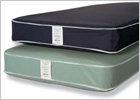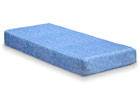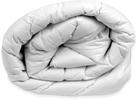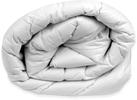Bed Wetting or 'Nocturnal Enuresis' In Children, Teenagers and Young Adults
In the following article we will share some bedwetting advice for parents and explore briefly some of the causes, symptoms and solutions to this common problem.
Nighttime bedwetting or nocturnal enuresis, to use the medical term, is usually categorised by two specific types. It is worth remembering that the two types of enuresis can have different causes and treatments, but can be closely related.
- Primary Enuresis - that is children who have always wet the bed.
- Secondary Enuresis - which refers to a child over the age of five who has been dry for six months or more who starts to wet the bed again.
Two very important factors to remember are; firstly, bedwetting isn’t your child's fault. Wetting the bed has nothing to do with your child being naughty or lazy, and by understanding the possible causes to this problem you will be able to support your child without judgement.
Secondly, bed wetting is very common and can occur at any age. It is not unheard of for bedwetting to make an unwelcome comeback around the onset of puberty, affecting one in 75 teenagers.
There are many differing opinions on the causes of bedwetting, but some of the agreed upon factors include:
Constipation can be a trigger. A constipated bowel squeezes the bladder and can contribute to bedwetting episodes. Addressing the issues behind constipation should help with the bedwetting problem.
The bladder and the brain are on different wavelengths. As we get older we begin to form neural connections that tell our brain when our bladder is full. In some children these connections do not develop as fast as others. This can lead to not feeling the need to pee while sleeping even when the bladder is full, but this will usually resolve with age.
The bladder needs exercising. To keep in a strong and functional condition, the bladder needs regular exercise just like any other muscle. To ensure the bladder is able to reach its full capacity, drinking enough fluids during the day is vital.
Stress at home or at school. This is a factor that is often overlooked but can be playing a large part in your child’s bedwetting problem. Feelings of shame and embarrassment caused by bedwetting, especially as your child gets older can make the problem worse. For this reason it is important to let your child know that it is not their fault and that help is out there. A waterproof mattress can help to alleviate feelings of embarrassment and enable easy cleaning after these incidents occur.
Bedwetting can be a sign of a medical condition or infection, but help is out there. Underlying medical conditions such as diabetes and urine infections can cause bedwetting in both children and adults. If you suspect that either you or your child may be affected, do not hesitate to contact your GP.
By investing in a product like a waterproof mattress, or a waterproof duvet or pillow, you can remove the anxiety from both yourself and your child when these bedwetting problems occur. These products are affordable and specially designed to suit your needs.
Hospital grade waterproof mattresses are also available for heavy incontinence, such as every night bedwetting and soiling. These products meet stringent NHS requirements on health and safety, ease of cleaning and longevity of product.
To recap on what we have learned here today about enuresis, let’s look at some do’s and don’ts for parents like you dealing with bedwetting in children.
Do:
- make sure your child goes to the toilet regularly, around 4 to 7 times a day, including just before bedtime
- make sure they have easy access to a toilet at night
- use a waterproof mattress and waterproof duvet on their bed at night
- give your child enough water to drink during the day
- agree with your child on rewards for positive actions, such as a sticker for every time they use the toilet before bed
Don’t:
- do not regularly wake or carry your child in the night to use the toilet – this will not help in the long term
- do not punish your child – it is not their fault and can make bedwetting worse
- do not give your child drinks containing caffeine, such as cola, tea and coffee – this can make them pee more
Above all, do not worry, a large percentage of children simply grow out of this problem as they get older, and for those who find it more difficult to stay dry throughout the night there are many products designed with this problem in mind that can put yours and your child's mind at rest.
-

2ft 6in Small Quilted Single Waterproof Mattress
£179.99 - £379.99
-

3ft Single Waterproof Mattress - Quilted
£179.99 - £379.99
-

4ft Small Double Waterproof Mattress - Quilted
£219.99 - £449.99
-

4ft 6in Double Waterproof Mattress - Quilted
£219.99 - £449.99
-

3ft Single Waterproof Mattress - Sfonia Superior Foam
£229.99 - £449.99
-

4ft 6in Double Waterproof Mattress - Sfonia Superior Foam
£299.99 - £499.99
-

2ft 6in Small Single Waterproof Mattress - Sfonia Superior Foam - Heavy Incontinence
£229.99 - £449.99
-

4ft Small Double Waterproof Mattress - Sfonia Superior Foam - Heavy Incontinence (Every Night)
£299.99 - £499.99
-

Hospital Grade Waterproof Mattress - 3ft
£269.99 - £499.99
-

Hospital Grade Waterproof Mattress - 2ft 6in Small Single
£269.99 - £499.99
-

Hospital Grade Waterproof Mattress - 4ft Small Double
£349.99 - £549.99
-

Hospital Grade Waterproof Mattress - 4ft 6in Double
£349.99 - £549.99
-

Single Size Waterproof Duvet
£39.99 - £59.99
-

Double Size Waterproof Duvet
£49.99 - £79.99
-

Breathable Waterproof Pillow
£19.99 - £29.99